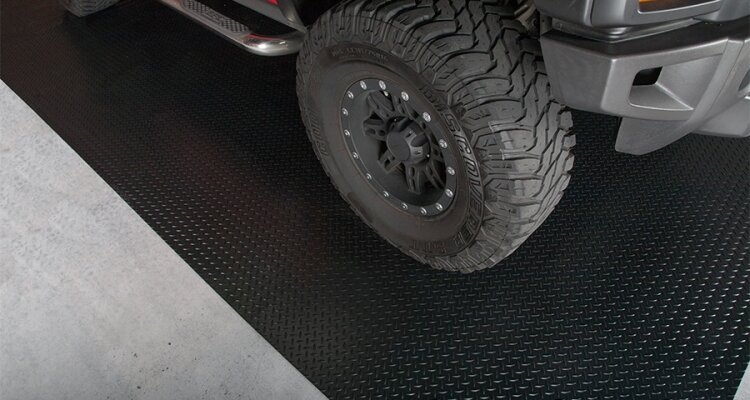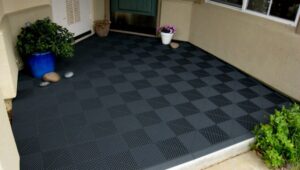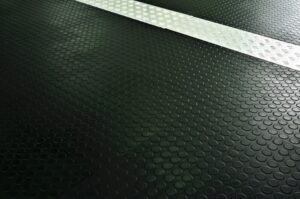A Comprehensive Guide to PVC Mats: Your Durable and Versatile Flooring Solution

The top characteristics of garage floor tiles
garage floor should have the following characteristics:
- driveway (obviously)
- wear-resistant
- equipped with anti-slip elements
- water repellent, stain-resistant
- anti-aquaplaning (with adequate slope, rainwater collection channels, drainage pipes)
- with the elastic base to absorb the vibrations produced by vehicle traffic
In this article, we will talk about how to make a functional and economical garage floor, using different materials (resin, PVC, concrete, stoneware, rubber).
We will focus on the prices of the different types of cladding and give you some good advice on how to save, both on materials and on installation.
An inexpensive garage floors
How much does it cost to pave the garage or garage?
 The cheapest coating is sheet rubber flooring. The rubber sheets have a minimum thickness (3 mm) and can be used both to cover the old coating and for laying on a concrete screed.
The cheapest coating is sheet rubber flooring. The rubber sheets have a minimum thickness (3 mm) and can be used both to cover the old coating and for laying on a concrete screed.
Thanks to special bubbles, these floors also have good anti-slip properties, are fireproof and protect the underlying coating from oil and petrol.
A rubber garage floor can also be made using interlocking tiles, to be fixed with glue or to be laid dry.
A black rubber garage floor costs just R200/sqm. The thicker (1.5 cm) rubber squares for industrial use cost around R500 / m2.
Continuing the reading of the article, you will find the prices of the other coverings.
Garage floor: a tip for saving
What can you do if your budget is limited and you don’t want to fall back on the cheaper alternative?
In this case, you can try to look for cheap alternatives near where you live by comparing the offers of specialized firms in your area.
The professionals closest to you can
- perform a free site survey, suggesting alternatives you may not have thought of
- purchase materials for yourself, taking advantage of special agreements with retailers
- also save you money on installation.
For jobs close to their headquarters, many companies are inclined to negotiate on the price because
- they save on the transport of workers, materials, and equipment
- they advertise themselves through word of mouth or through their own creations.
Estimates in your area without losing your mind? that’s how
If you have little time to explore the offer in your area, you can request free estimates from specialized companies close to you also through our site.
Just fill out a short request with some contact details. In a few hours, you will receive three quotes from as many specialized companies close to where you live, complete with prices.
Garage floors: prices
As we had anticipated, here are the different alternatives to cover the garage floor, with costs per square meter.
Resin garage floor
 Floor resins can be applied to a new concrete screed or an old coating. Depending on the needs (for example to avoid changing the fixtures) they can be spread in layers ranging from 3 mm to 1 cm.
Floor resins can be applied to a new concrete screed or an old coating. Depending on the needs (for example to avoid changing the fixtures) they can be spread in layers ranging from 3 mm to 1 cm.
Most of the resins on the market are polyurethane or epoxy, characterized by a fast laying, many colors, and a good resistance to stains and humidity.
Resin and concrete floors, on the other hand, are water-based (more ecological). Cement resin coatings are very resistant to both abrasion and humidity.
A resin garage floor has a basic cost of R300 / sqm, depending on the finishes and colors. A resin-coated concrete floor cost more, around R600 / m2.
Garage floor in PVC
 PVC (polyvinyl chloride) is a plastic compound used for hundreds of different applications, including coatings. It is fireproof, water-resistant (a little less to oil and petrol stains, which must be removed as soon as possible), light, sound-absorbing, easy to lay, and very versatile.
PVC (polyvinyl chloride) is a plastic compound used for hundreds of different applications, including coatings. It is fireproof, water-resistant (a little less to oil and petrol stains, which must be removed as soon as possible), light, sound-absorbing, easy to lay, and very versatile.
The self-laying PVC tiles allow you to create do-it-yourself floors in a short time, thanks to the interlocking installation. For the garage, however, PVC floors with glue laying, more resistant to wear, are suitable.
A garage floor in PVC costs from R180-R250 / sqm. Ultra-thin PVC tiles are cheaper (just R180 / sqm), but not very suitable for a drive-over floor.
Concrete garage flooring
Concrete floors are by far the most suitable for driveway surfaces, being extremely resistant to load wear (even withstand several tons of weight), abrasion and stains. In addition, they last more than twice as long as other types of flooring.
A medium-thick concrete flooring (about 8 cm) costs about R700 / m2. Any armor, stain-resistant or non-slip coatings, or special finishes such as polishing, influence the price.
For small garages (30-50 sq m) the cost is not calculated per sq m but at a flat rate. The peculiarity of these coatings, in fact, is that they cost less as the square footage to be coated increases.
Porcelain stoneware garage floors
The stoneware garage floors are made with special thick driveway tiles, between 1 and 3 cm high. The stoneware tiles are particularly suitable for mixed environments (garage with laundry corner, a small tool shed) where there is a need for easy cleaning and a floor that does not absorb oil and grease stains.
The prices of the drive-over stoneware tiles, which can also be equipped with non-slip stamps, range from R300 upwards.
Cover the floor of an existing garage
Coating a worn garage floor, without removing it? Fortunately, you can and without spending too much. In fact, all the coatings we have listed can be applied to pre-existing floors.
Before doing so, however, it must be checked that the pre-existing garage covering / floor is:
- flat – the surface must be perfectly flat
- stable – the surface must not have tiles or unstable parts
- adherent – the old coating must adhere perfectly to the screed
- intact – the old coating must not have any missing parts
- hard – old screeds may crumble or deteriorate, in this case, the problem must be solved before applying the new coating
- dry – no moisture should emerge, in this case, the problem must be identified and solved
- clean – there must be no dirt or dust residues.
Once all the problems that may arise have been resolved, it is possible to apply the new low-thickness coating, using cement mortar, special glues, or dry laying.
Preferred would be all those coatings that offer great strength even at low thicknesses, such as cement, cement resin, and PVC.
This Post Has 0 Comments